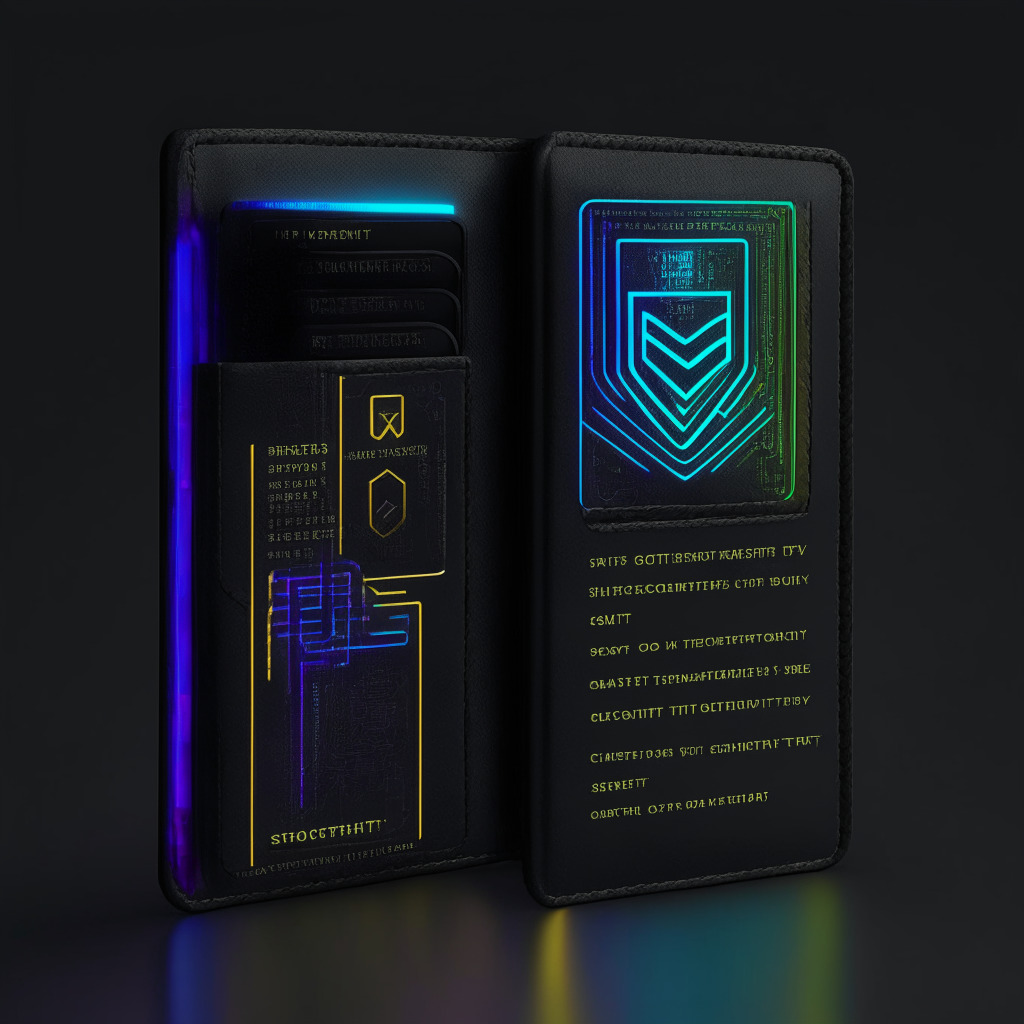Trust Wallet’s native TWT token has seen a 30% increase due to development activity on the Binance Smart Chain. Despite indications of a possible retracement, TWT exhibits strong momentum ahead of a major release announcement. Meanwhile, TG.Casino, a Telegram-based casino with a strong blockchain ecosystem, is getting attention with a staggering staking APY of 3,446%.
Search Results for: Trust Wallet
Trust Wallet Token’s Exhilarating Rise: Behind the Hype, Risks, and Cautionary Notes
Trust Wallet Token (TWT), a native utility token, experienced a 20% increase recently, fuelled by market speculation and a cryptic tweet from the developer suggesting a future announcement. The token has shown promising progress, surpassing multiple moving averages, yet struggles to break the $1.0 resistance level. Despite the potential, investors should consider diversifying their portfolios and proceed with caution.
Trust Wallet Security Analysis: AX1 Research Highlights Strengths and Room for Improvement
AX1 Company’s research on Trust Wallet reveals its strong encryption, multi-factor authentication, and timely security updates. However, AX1 suggests improvements in transparency, user education, and a comprehensive security policy for enhanced user confidence and security.
Atomic Wallet Security Breach: Examining Trust and the Challenge of Ensuring Crypto Safety
Atomic Wallet, with over five million users, suffered a security breach resulting in users losing funds. On-chain investigator ZachXBT is assisting affected individuals. The breach questions the wallet’s security and highlights the challenge of achieving complete security in the decentralized financial landscape.
Exploring Magic’s $52M Funding: Wallet-as-a-Service Future, Adoption, and Trustworthiness
San Francisco-based Magic has raised $52 million in a funding round led by PayPal Ventures, with participation from venture firms like Cherubic, Synchrony, and Northzone. Magic offers a wallet-as-a-service solution, widely used in retail, music, and gaming industries, enabling digital ownership opportunities and expanding functionality. The company aims to increase adoption in the European Union and Asia-Pacific region.
Crypto Community Debates: Ledger Recover’s Impact on Wallet Security and Trust
Ledger’s announcement of their upcoming private key recovery service, Ledger Recover, sparked skepticism among the crypto community, raising concerns about potential attack vectors and compromising the security of Ledger hardware wallets. The company has delayed the service and plans to address user feedback in an upcoming Twitter Spaces town hall event.
Open-Source vs. Closed-Source Wallets: Analyzing Security Risks and Trust in Manufacturers
Charles Hoskinson, Cardano founder, prefers open-source software for security, while Ledger co-founder Eric Larchevêque argues it poses elevated security risks. Larchevêque believes closed-source wallets with secure elements offer higher security levels and states that security always involves trade-offs and requires trust in hardware wallets.
Ledger Recover Debate: Trust vs Trustlessness in Crypto Hardware Wallets
The launch of Ledger Recover, a service enabling Ledger hardware wallet users to back up their secret recovery phrases, has faced pushback from the crypto community due to concerns about seed phrase security. Ledger’s co-founder Éric Larchevêque responded stating that the wallet was never meant to be trustless and trust is necessary to use the product.
Ledger’s Key-Recovery Feature: The Privacy, Security, and Trust Dilemma in Crypto Wallets
Ledger’s new key-recovery feature, Ledger Recover, faces criticism as opponents argue it undermines the inherent security of hardware wallets. Privacy concerns arise since identities are linked to crypto wallets, and trust issues persist due to Ledger’s closed source code. The feature attempts to balance cold storage autonomy with custodial storage convenience, but increased security risks make its adoption uncertain among sophisticated users.
Ledger’s Deleted Tweet Controversy: Balancing Trust and Security in Crypto Wallets
Ledger CTO Charles Guillemet clarified that the wallet’s OS requires user consent before accessing private keys, dispelling concerns after a controversial tweet about firmware capable of extracting users’ private keys. The controversy highlights the delicate trust balance and the importance of transparency between wallet providers and users.
Ledger’s Firmware Fiasco: Trust, Transparency, and the Push for Open-Source Crypto Wallets
Hardware wallets play a pivotal role in securing private keys and ensuring the safe storage of valuable digital assets. Recent concerns about Ledger’s controversial firmware update led competitor GridPlus to announce open-sourcing its firmware, promoting transparency and urging other manufacturers to follow suit. The debate highlights the importance of striking a balance between privacy, security, and trust in the cryptocurrency industry.
Ledger’s Controversial Update: Balancing Security, Privacy, and Trust in Crypto Wallets
Ledger’s hardware wallet is facing criticism after announcing an update that allows users to link their seed phrase to their identity card or passport, raising privacy concerns. This update necessitates trusting a third party with sensitive ID information, making recovery seed phrases potentially vulnerable to data leaks, hacks, and possible government surveillance.
Chainlink’s Signature Change: A Decentralization Dilemma Stirring Trust and Security Concerns
Chainlink recently made an unannounced change to its multi-signature wallet. The number of signatures required for transactions was reduced, which raised concerns about the decentralization risk of the blockchain platform. Despite clarifications from Chainlink, the skepticism remains and highlights the often unresolved trade-off between absolute decentralization and absolute security in the blockchain world.
Building Your Own Cryptocurrency Wallet: Alluring Innovation or Security Nightmare?
Using Trezor’s open-source code, electronics design manager Florin Cocos constructed his own DIY Trezor cryptocurrency wallet. However, creating a functioning hardware wallet requires expertise in electronics and significant time investment. Aspects including potential security vulnerabilities and the required level of technical know-how should also be considered before undertaking such a project.
Unfolding Grab’s Web3 Wallet Experiment: Boon or Bane for Southeast Asia’s Crypto Future?
“Southeast Asian tech giant, Grab collaborates with stablecoin operator Circle to test a Web3 wallet in their superapp, offering non-fungible token (NFT) vouchers to users. They aim to mainstream blockchain tech and integrate stablecoins into daily transactions. However, issues around data privacy and security underscore the need for clear regulation in this largely uncharted territory.”
Redefining Consumer-Brand Relationships: Wallet 3.0, Privacy and the Future of Engagement
“Wallet 3.0, Web3’s killer application, is reshaping customer-brand engagement towards a more privacy-centric experience enabled by decentralized tech. Brands are recognizing the need for transparency and user privacy, transitioning to user-owned, NFT-enabled wallets for more direct and trustworthy interactions, leading to enhanced loyalty, lower CAC, and improved CLTV.”
Fireblocks’ Non-Custodial Wallets: Shaping the Future of Digital Asset Control and Security
Cryptocurrency custody firm Fireblocks, in response to market leaders’ high-profile collapses, introduces a non-custodial wallet service, giving users control over their cryptographic keys. Adopting a fully non-custodial setup empowers users, bypasses regulatory restrictions and potentially revolutionizes fintech and blockchain technology’s future.
Downfall of Prime Trust: Highlighting the Risks of Cryptocurrency Self-Custody
“The downfall of cryptocurrency custodian Prime Trust underscores the risks of self-custody and highlights a dearth of proficient custodians in the crypto sector. With the mishandling of technology leading to “integration failure” and assets left stranded, regulators are now considering the need for investment advisers to use qualified custodians for digital assets. Anchorage Digital, the first federally chartered crypto bank in the US, continues to call for clarity on digital assets definitions.”
Unveiling Crypto Scams: Navigating the Minefield of Phishing Attacks and Wallet Drainers
“Phishing and wallet draining scams are increasingly prevalent in the digital monetary sphere, with platforms hiding links within texts. Cybersecurity experts suggest a defense approach that requires both users and platforms to contribute to safety measures. User education and vigilance, along with strict platform security, are crucial for securely navigating the growing world of cryptocurrencies.”
Ethereum Threatens Bitcoin’s Supremacy Amid Marathon’s Production Dip and Grayscale’s Exposed Wallets
Bitcoin’s market position becomes increasingly complex with dips in mining due to hot weather and revealed wallet addresses for the Grayscale Bitcoin Trust. Meanwhile, Ethereum’s surging trading volume challenges Bitcoin’s dominance, as the future of Bitcoin is shaped by evolving developments and market fluctuations.
Custodial vs Non-Custodial Crypto Wallets: A Balancing Act of Convenience and Security
“The article debates the merits of custodial versus non-custodial wallets in cryptocurrency. Custodial wallets, managed by third parties, offer simplicity but present security risks. Non-custodial wallets provide total control, upholding cryptocurrency’s core ethos of decentralization but with less convenience. The choice involves balancing security, control, and services.”
Sybil Attack on Connext Network: Exploring Security vs Convenience in Decentralized Trust Systems
The Connext Network, a protocol for native blockchain bridges, recently endured a ‘sybil attack’— a suspicious wallet exploited the protocol’s token airdrop, making over 200 claims. This unexpected event underscores the critical balance between security and convenience in decentralized trust systems.
Ethereum-based Wallet Scams: The Dark Side of Crypto Convenience or Heightened Awareness Call?
“Scammers exploit MetaMask’s reputation by redirecting users to fake websites via official government website URLs. Unwary users link their MetaMask wallets to these hoax sites, inadvertently giving fraudsters control over their assets. Despite MetaMask’s efforts, such scams have left crypto enthusiasts questioning their holdings’ security.”
Shibarium’s Rapid Wallet Growth Vs Underwhelming TVL: Brilliant Supernova or Steady Harbinger?
“Shibarium, Shiba Inu’s layer-2 blockchain network, has reached one million wallets since its relaunch, despite initial technical issues. Despite this, the total value locked is reportedly a modest $1.06 million, indicating users’ cautious capital commitment to the network.”
Infamous Chisel Malware: The Hidden Threat to Crypto Wallets on Android Devices
“Crypto wallet owners are warned of a new malware, “Infamous Chisel,” linked to the Russian military intelligence agency. It targets Android devices, primarily Binance, Coinbase and Trust wallet applications, posing a significant threat to crypto security.”
Crypto Custodianship Catastrophe: Examining the Financial Mismanagement of Prime Trust
“The case of crypto custodian Prime Trust losing $8 million in a terraUSD algorithmic stablecoin investment highlights the huge risks involved in such ventures. This comes alongside allegations of mismanagement and imprudent financial practices, and serves as a stern warning about the high-stakes and minimal margin for error in the crypto market.”
The Downfall of Las Vegas Crypto Custodian Prime Trust: An Inside Look into the Bankruptcy Fallout
“Las Vegas cryptocurrency custodian, Prime Trust, filed for Chapter 11 bankruptcy amid liabilities ranging from $100 to $500 million. The future of this fintech enterprise now heavily depends on solving regulatory challenges and finding a willing buyer. Widespread financial turmoil has been revealed within the company, with debts surmounting to over $85 million in fiat and $69.5 million in cryptocurrency.”
Bitget Wallet: A Beacon of Safety or A Potential Threat in a Volatile Cryptocurrency Landscape?
Bitget Wallet, previously BitKeep, recently created a $360 million User Protection Fund to enhance security following a malware incident that led millions into loss. The wallet now includes stable payment channels and a P2P marketplace for smoother transactions, while underlining the importance of user education, stringent security measures, and swift responses to breaches.
Unmasking BitForge: The Hidden Vulnerabilities of Multi-Party Computation Technology in Crypto Wallets
Fireblocks, a crypto infrastructure company, exposed vulnerabilities, known as “BitForge”, in crypto wallets that use multi-party computation (MPC) technology. High-profile firms including Coinbase, ZenGo, and Binance quickly partnered with Fireblocks to counter these vulnerabilities, thus safeguarding against potential exploitation. The vulnerabilities highlighted safety issues about the previously assumed secure MPC wallets.
Unmasking the BitForge Vulnerability: A Wake-up Call for Crypto Wallet Security
“Blockchain security firm, Fireblocks, revealed a vulnerability in crypto wallets using multi-party computation (MPC) technology, affecting major wallets like Coinbase and Binance. Rapidly addressed, the incident underscores the inherent risks in the Web3 domain and the importance of vigilance and proactive security measures in crypto.”
Crypto Wallets Under Siege: Unpacking Security Testing & Vulnerability in Digital Finance
“A recent report by CER revealed that only six out of 45 reviewed crypto wallets conducted penetration testing to identify security vulnerabilities. Despite the alarming number, some wallet brands are using alternative methods like bug bounties to uncover vulnerabilities, thereby raising questions about the effectiveness of current security strategies in protecting digital assets.”
Navigating Online Hazards: Phishing Scams Pose Threat to Crypto Community and Market Trust
“In a bold phishing scam, Blockchain Capital’s Twitter was hijacked with the hackers constructing a sham giveaway to exploit the public. The incident, echoing recent FBI warnings about scams in the crypto and NFT space, underlines the importance of robust cybersecurity in the increasingly mainstream world of crypto technology.”






























